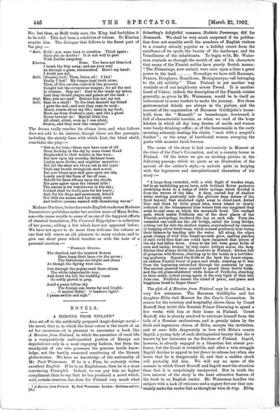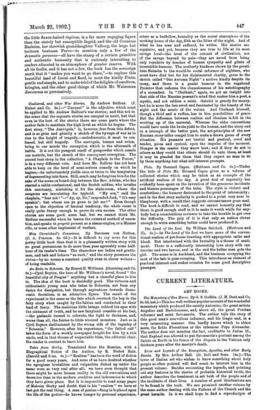NOVELS.
A HEROINE FROM FINLAND.* As a set-off to the artificially prepared Anglo-foreign novel— the novel, that is, in which the local colour is the result of an ad hoc excursion—it is pleasant to encounter a book like A Heroine from Finland, in which the amenities of rural life in a comparatively unfrequented portion of Europe are depicted not only in a most engaging fashion, but from the standpoint of one who possesses the genuine inside know- ledge, not the hastily crammed smattering of the literary globe-trotter. We have no knowledge of the nationality of Mr. Paul Waineman. If he is a Finn, he certainly writes excellent English. If he is an Englishman, then he is a most convincing Finnophil. Indeed, we can pay him no higher compliment than to say that he has produced a novel which, with certain reserves, has done for Finland very much what • A Heroine from Finland. By Paul Waineman, London ; Methuen and Co. 08-3 Scharling's delightful romance, Noddebb Parsonage, did for Denmark. We shall be very much surprised if its publica- tion does not sensibly swell the numbers of English visitors
to a country already popular as a holiday resort from the excellence of its sport, the beauty of the landscape, and the friendliness of the inhabitants. To begin with, Mr. Waine- man reminds us through the mouth of one of his characters that many of the Finnish nobles have purely Scotch names : " The Flemming°, now extinct, were once upon a time a great power in the land Nowadays we have still Ramsays, Frasers, Douglases, Ilamiltons, Montgomerys,—all belonging to the old nobility." Then Finland in yet another way reminds us of our neighbours across Tweed. It is another Land of Cakes ; indeed, the description of the Finnish cuisine generally, as given by Mr. Waineman, would be in itself an inducement to some readers to make the journey. But these gastronomical details are always in the picture, and the account of the organisation of Baroness Guldhjelm's house- hold, from the " Mamsell," or housekeeper, downward, is full of characteristic touches, as when we read of the huge kitchen in which all day long dozens of maids and women were busily drinking coffee; or of the housemaids in the early morning solemnly dusting the chairs, " each with a seagull's feather" ; or the army of barefooted women sweeping the paths with monster birch-brooms.
The scene of the story is laid successively in Moscow at the time of the Czar's Coronation, and at a country house in
Finland. Of the latter we get an inviting picture in the following passage, which we quote as an illustration of the naiveté of the author's style,—a naïveté quite in keeping with the ingenuous and unsophisticated characters of his story
"A large deep verandah, with a wide flight of wooden steps, led to an undulating green lawn, with brilliant flower parterres stretching down to a hedge of white syringa which divided it from the waters of the lake. A deep, curved bay of shallow water melting gradually into the glorious deep waters of the fjord beyond, that stretched right away to cloud-land, dotted here and there by little green isles, every island so clearly reflected in the transparent blue waters that one imagined they must be real ones, on which the mermaids lived. The verdant park, which makes Fridholm one of the show places of the Finnish archipelago, bordered the bay on each side. From the verandah one could see the old bridge, called the Long Bridge, jutting out far into the shallow waters, overshadowed by clusters of hanging silver birch trees, which seemed perilously near losing their balance by bending into the water. All along the edges great clumps of wild blue forget-me-nots grew, making patches of such vivid blue that one could have imagined that pieces of the sky had fallen down. Away to the left were great fields of corn and barley, broken by tiny rustic bridges across the deep ditches that always divide the meadows in Finland ; ditches full of gorgeous wild flowers, climbing up to the banks in a bewilder- ing profusion. Beyond the fields at the back the forest reigns, an endless Finnish forest of peace and shade, standing as it was from the beginning untouched through the centuries by man. The ancient gnarled trees seemed to guard those fertile fields, and the old green-shuttered white house of Fridholm, standing in their midst, looked young again in the rosy light of that late June sun. Fridholm means the island of peace, and peace and happiness loved to linger there."
The plot of A Heroine from Finland may be outlined in a
very few sentences. The Baroness Guldhjelm and her daughter Ebba visit Moscow for the Czar's Coronation. In return for the courtesy and hospitality shown them by Count Rostoff they invite this Russian Prince Charming to spend a few weeks with him at their home in Finland. Count Rostoff, who is already resolved to extricate himself from the toils of a Russian enchantress, and is greatly taken by the fresh and ingenuous charm of Ebba, accepts the invitation, and at once falls desperately in love with Ebba's cousin Ingrid, a young lady of such distinguished beauty that she is known by her intimates as the Duchess of Finland. Ingrid, however, is already engaged to a blameless but absent pro- fessor, but the Count is irresistible, and after a vain struggle
Ingrid decides to appeal to her fiancé to release her, when she
hears that he is dangerously ill, and that a sudden shock will probably kill him. We will say no more of the manner in which Count Rostoff and Ingrid meet the situation than that it is surprisingly unexpected. But in truth the love interest of the story is the least attractive feature of
the book to an English reader. Mr. Waineman handles the subject with a lack of reticence and a sugary fervour that con- stantly make the reader feel as though he were de trap. Ebbs, the little flaxen-haired ingenue, is a far more engaging figure than the stately but susceptible Ingrid, and the old Countess Barheim, her shrewish granddaughter Valborg, the huge but taciturn boatman Pervo—to mention only a few of the dramatis personae—all have the stamp of a certain primitive and authentic humanity that is curiously interesting to readers educated in an atmosphere of greater reserve. With all its faults, and it has not a few, the book has the sovereign merit that it "makes you want to go there,"—to explore this beautiful land of forest and flood, to meet the kindly Finns, gentle and simple, and to make trial of the delights of smultron, kringlas, and the other good things of which Mr. Waineman discourses so persuasively.











































 Previous page
Previous page